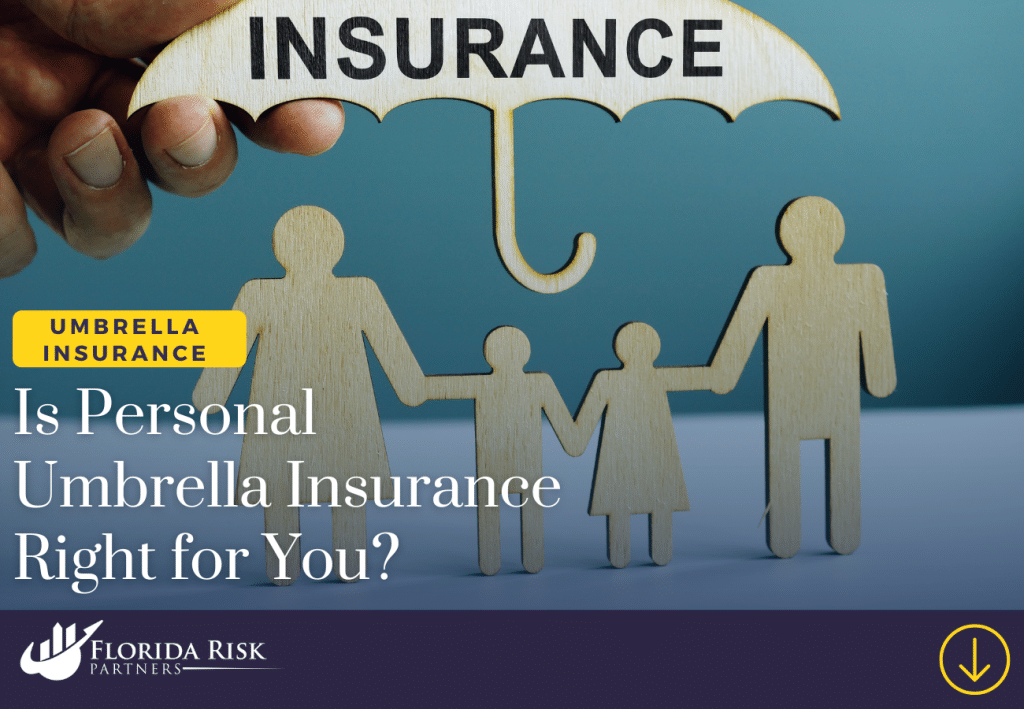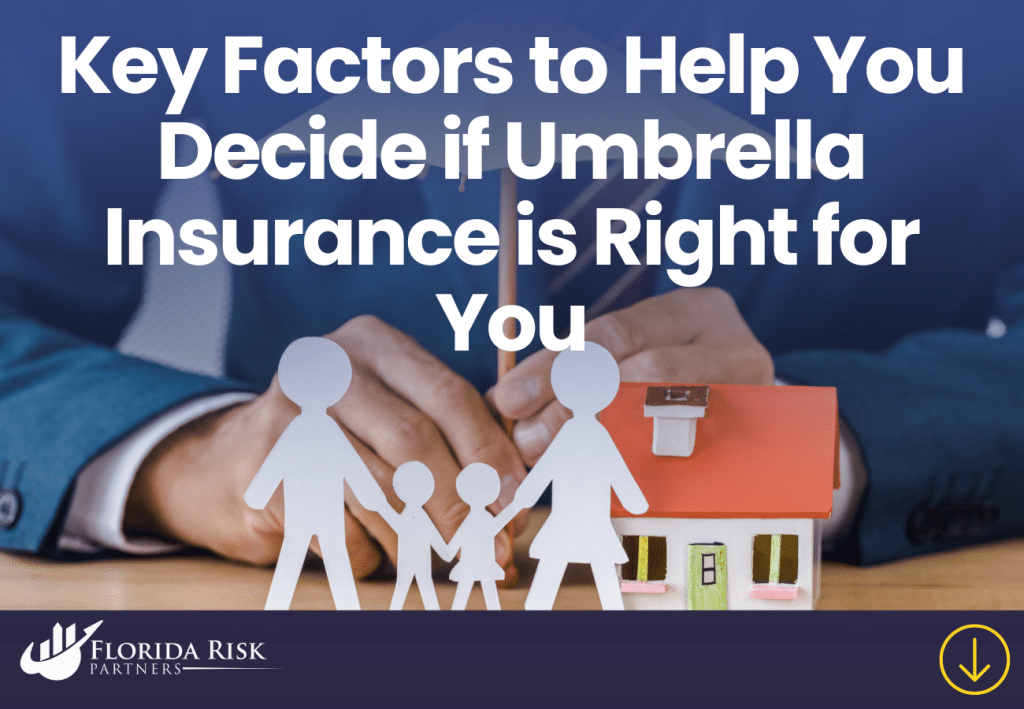-
Main Office: 1434 E. Bloomingdale Ave Valrico, FL 33596-6110
-
Phone: (888) 601-6660
-
Email: info@floridariskpartners.com

When it comes to insurance, everyone has different needs based on their lifestyle, assets, and level of liability exposure. Personal umbrella insurance is an extra layer of liability protection that kicks in when the limits of your standard policies, like homeowners and auto insurance, are reached. But how do you know if this coverage is right for you? For many, umbrella insurance offers essential financial protection that goes beyond what basic policies can cover.
In this post, we’ll outline the types of people who benefit most from umbrella insurance, common scenarios where it’s invaluable, and key factors to help you determine if umbrella insurance is the right choice for your financial security. By the end, you’ll have a clear understanding of how umbrella insurance works and whether it fits your needs.
Understanding the Basics of Personal Umbrella Insurance
Before we dive into who needs umbrella insurance, it’s helpful to have a refresher on what it is and how it functions. Umbrella insurance provides extra liability coverage that goes beyond the limits of your primary policies, such as homeowners, auto, or renters insurance. It covers costs for which you might be liable if an accident or unexpected event results in damages that exceed your primary policy’s limits.
For example, if you’re at fault in a car accident that results in $1 million in damages, but your auto policy only covers up to $300,000, your umbrella insurance would cover the remaining $700,000. Umbrella insurance also covers additional types of claims that are typically excluded from standard policies, such as defamation, invasion of privacy, and wrongful arrest.
Most umbrella policies offer coverage in increments of $1 million, making it easy to tailor the coverage to your specific needs and financial situation. Now, let’s look at some profiles of individuals who would benefit the most from umbrella insurance.
Who Benefits Most from Personal Umbrella Insurance?
Umbrella insurance isn’t a one-size-fits-all product, but there are specific types of people and situations where it provides essential protection. Here are some key profiles for whom umbrella insurance can make a significant difference.
1. Individuals with High Net Worth
For individuals with a high net worth, umbrella insurance is a critical layer of protection. If you have substantial assets, such as savings, real estate, investments, or valuable personal property, these could be at risk if you’re held liable in a lawsuit that exceeds your primary insurance limits. In cases where the damages are high, having umbrella coverage can prevent the need to liquidate assets or dip into retirement funds.
Example Scenario: Imagine you own multiple properties and have considerable investments. You’re involved in a severe car accident, and the other party files a lawsuit seeking damages that go beyond your auto insurance limits. Without umbrella insurance, you could be forced to sell assets or deplete your investments to cover the cost. With umbrella insurance, however, you’re protected up to the umbrella policy’s limit, preserving your assets and financial stability.
2. People with High Earning Potential
Even if you don’t currently have a high net worth, umbrella insurance is wise for those with high earning potential. Your income and future earnings could be at risk if you’re faced with a significant liability claim, as judgments against you could lead to wage garnishment to satisfy the debt. For young professionals, executives, or business owners with significant earning potential, umbrella insurance provides peace of mind knowing their future income is protected.
Example Scenario: You’re a successful professional in the early stages of building wealth. While you may not have a lot of savings yet, your earning potential is high. If you’re involved in a liability claim where damages exceed your primary policy’s limits, your umbrella insurance would cover the additional amount, protecting your future income from wage garnishment or legal judgments.

3. Homeowners, Especially Those Who Frequently Entertain Guests
Owning a home comes with unique risks, particularly if you frequently host events or gatherings. Any time someone visits your home, there’s a chance they could be injured. If a guest is seriously injured and decides to sue, you could be held liable for their medical bills, lost wages, and more. Homeowners insurance typically covers these types of claims, but if the costs exceed your policy’s limits, umbrella insurance is essential.
Example Scenario: Imagine you host a family reunion at your home. One of your relatives slips on a wet spot by the pool, resulting in significant injuries and medical bills totaling $500,000. If your homeowners insurance only covers up to $300,000, you would be responsible for the additional $200,000. With umbrella insurance, you would have coverage beyond your homeowners policy, ensuring you’re not paying out of pocket.
4. Families with Teenage Drivers
If you have a teenager who is just learning to drive, you already know the insurance rates for young drivers can be high due to their inexperience. But young drivers also increase your liability exposure. Accidents involving teen drivers often result in high damages, given their inexperience on the road. In such cases, umbrella insurance can provide extra protection if an accident results in a claim that exceeds your auto policy’s limits.
Example Scenario: Your teenager causes a multi-vehicle accident while driving, resulting in injuries to multiple parties. The damages total $1 million, but your auto insurance only covers up to $250,000. Without umbrella insurance, you’d be responsible for the remaining $750,000, which could be financially devastating. However, with umbrella insurance, the additional costs would be covered, providing essential protection for your family.
5. Individuals with Rental Properties
Owning rental properties can be a profitable investment, but it also brings additional liability risks. As a landlord, you could be held liable if a tenant or their guest is injured on your property. Standard landlord insurance provides some liability coverage, but it may not be enough if a claim exceeds your policy limits. Umbrella insurance provides extra protection for these high-risk situations.
Example Scenario: A tenant’s guest falls on a poorly lit staircase in your rental property and sustains serious injuries, resulting in a lawsuit for $800,000 in damages. If your landlord insurance only covers $300,000, your umbrella policy would cover the remaining $500,000, protecting your rental income and assets.
6. Public Figures or Individuals with a Strong Online Presence
Public figures and influencers face higher risks of personal injury claims like defamation or privacy invasion. Umbrella insurance is invaluable for individuals with high visibility, as these types of personal injury claims are not typically covered by homeowners or auto insurance.
Example Scenario: Suppose you make a public comment that unintentionally harms another person’s reputation, and they sue you for defamation. The legal fees and potential settlement costs could reach hundreds of thousands of dollars. Umbrella insurance would cover these costs beyond your primary policy’s limit, protecting you from substantial financial loss.
Key Factors to Help You Decide if Umbrella Insurance is Right for You
Umbrella insurance suits specific profiles, but general factors also help determine its suitability.
Assess Your Assets and Net Worth
Assessing your total net worth is key to deciding on umbrella insurance. Significant assets like a home, investments, and retirement accounts need protection. Liability claims exceeding primary insurance can be financially devastating. Umbrella insurance provides effective, affordable additional coverage, making it a smart investment.
Evaluate Your Lifestyle and Activities
Certain lifestyle factors increase your liability exposure. For example, if you enjoy recreational activities that involve a level of risk (such as boating, skiing, or owning a pool), you’re at a higher risk of incidents leading to liability claims. Additionally, if you frequently host social events, have pets, or own rental properties, these factors increase your likelihood of facing a claim that exceeds primary insurance limits.

Consider Your Future Earnings
If you have high earning potential, think about how losing a portion of your future income to satisfy a liability judgment could impact your financial goals. Umbrella insurance protects assets and future earnings from unexpected incidents.
Review Your Existing Policy Limits
Take a close look at the liability limits on your homeowners, auto, and other primary insurance policies. If you find that these limits are low relative to your financial situation, umbrella insurance can fill the gap and ensure you have sufficient coverage in the event of a high-cost claim.
Calculate the Cost of Umbrella Insurance
Umbrella insurance is often more affordable than people realize, with coverage typically costing between $150 and $500 per year for $1 million in liability protection. Given the high value of the coverage provided, umbrella insurance offers an affordable way to secure your financial future.
Common Myths About Umbrella Insurance
Before making a decision, it’s essential to address some common myths about umbrella insurance that might prevent people from considering this valuable coverage.
Myth 1: Umbrella Insurance is Only for the Wealthy
Reality: While high-net-worth individuals certainly benefit from umbrella insurance, it’s valuable for anyone with assets to protect or high earning potential. Even middle-income families can face severe financial consequences without sufficient liability coverage.
Myth 2: My Primary Insurance Provides Enough Coverage
Reality: Primary insurance may fall short in severe accidents or lawsuits, leaving gaps in coverage. Umbrella insurance provides an extra layer of coverage that primary policies may lack.
Myth 3: Umbrella Insurance is Too Expensive
Reality: Umbrella insurance is relatively affordable, costing far less than most people expect for the level of protection it offers. For around $150 to $500 per year, you can add $1 million or more in liability coverage, making it a cost-effective way to protect your assets and future earnings.
Final Thoughts: Is Umbrella Insurance Right for You?
Ultimately, deciding whether personal umbrella insurance is right for you depends on your financial situation, lifestyle, and risk factors. If you fit these profiles or seek extra protection, umbrella insurance is a smart choice.
For a more in-depth look at how umbrella insurance can benefit you and further guidance on determining the right level of coverage, download our free e-book. This resource provides detailed scenarios, expert insights, and answers to common questions about umbrella insurance, helping you make an informed decision.
Get a free copy of our comprehensive guide to personal umbrella insurance
Umbrella insurance proactively secures your financial future, protecting assets and earnings against life’s uncertainties.
Call Us Or
Schedule an Appointment
Select an agent below to view our online calendars and select a day and time that works best for you or call us directly at 888-601-6660. When you use our online calendars, you will receive an email with more information.



